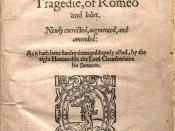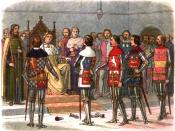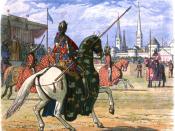1. Richard II is the first play in Shakespeare's second tetralogy, which continues with the two parts of Henry IV and concludes with Henry V, and dramatizes the beginning of what is called the War of Roses.
2. When the play was performed on the night before what was to be an abortive rebellion, Queen Elizabeth felt that she was being compared to Richard II and that the purpose was to cause a riot. Because of this, she censored the scene of Richard's deposition during her time.
3. In the play, we are much more attracted to Richard as a person than to his cousin Bolingbroke, his opponent. Richard is much more sensitive and poetic, however compared to Bolingbroke, Richard is an incompetent ruler, and when he takes away the land and title of his cousin he goes against the very concept of order and degree that causes him to be on the throne.
4. Even before the play starts, we are suspicious of Richard since he is believed by many to have murdered his uncle. When Bolingbroke accuses Thomas Mowbray of this murder, Mowbray and Bolingbroke are supposed to fight in order to see who is right. Richard is supposed to choose a winner, but instead he banishes both of them from the country.
5. Many people in the play, as well as most Elizabethans, do not believe that Richard's incompetentness is a reason for armed rebellion. This is because they were taught passive obedience in the Church which says that all rulers on Earth are appointed by God and so going against them is actually going against what God wants.
6. When Bolingbroke takes control of the country, a comparison that can be made between his ruling and Richard's is that Bolingbroke is the vessel of clay and Richard is the vessel of porcelain, although this doesn't tell us what is better.
7. At the end of the play, when Richard is in prison, he contemplates his life and heaven. It is ironic that after being so rich and powerful he is now the opposite, but now is when he feels assured that he will rise to heaven when he dies.
8. In this play, which is about men's struggles for power, women play the role of offering critical perspectives on the self-consuming games men play among themselves.
9. Imagery in this play link it to the same period that brought about Romeo and Juliet and A Midsummer's Night Dream.





